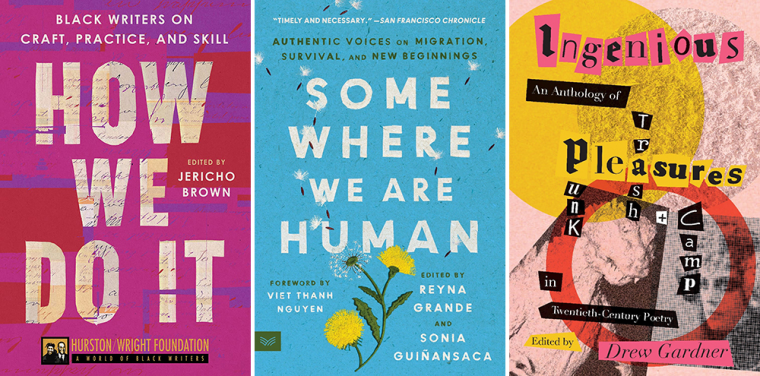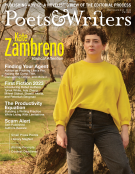Among the many new books published each season is a shelf full of notable anthologies, each one showcasing the work of writers united by genre, form, or theme. The Anthologist highlights a few recently released or forthcoming collections, including Somewhere We Are Human: Authentic Voices on Migration, Survival, and New Beginnings (HarperVia, June 2023).

What could be more thrilling than a “book of answers” from some of the nation’s leading poets and authors of fiction and creative nonfiction? That is how editor Jericho Brown imagined How We Do It: Black Writers on Craft, Practice, and Skill (Amistad, July 2023), as he writes in his introduction. Useful for any scribe, but particularly “for younger and newer Black writers in undergraduate and graduate workshops and in absolutely no workshop at all,” the volume offers practical insight into how successful authors do what they do: “What happens to move things from a blank page to a beautiful book?” Brown asks. Arranged to challenge genre boundaries, with sections addressing broad questions rather than specific points of craft, How We Do It includes essays by Marita Golden on memoir as a “slice” of life, Tayari Jones on how she finds a novel-worthy subject, Natasha Trethewey on writing as “a calling,” and many more leading Black voices on subjects ranging from the use of vernacular to “literary kinship.”
In Somewhere We Are Human: Authentic Voices on Migration, Survival, and New Beginnings (HarperVia, June 2023), undocumented and formerly undocumented writers and visual artists offer a complex look at their lives: “This book is a celebration of the unbreakable spirit and incredible talent of our communities,” write Reyna Grande and Sonia Guiñansaca in their editors’ note. Poems, essays, and images offer a breathtaking view of the many forces that compel people to leave their homes, from El Salvador to Thailand—and modes of surviving a fractured American dream. Celebrated writers such as Grace Talusan and Javier Zamora join emerging voices to give firsthand accounts of border-crossing, navigating society’s margins, and finding ways to thrive. In his foreword Viet Thanh Nguyen praises Somewhere We Are Human for refusing easy narratives, throwing “the borders of geography, nationality, gender, sexuality, and identity into question.”
Last century’s poetry was a morass of movements: Dadaism, surrealism, imagism, confessionalism, to name a few. In Ingenious Pleasures: An Anthology of Punk, Trash, and Camp in Twentieth-Century Poetry (University of New Mexico Press, June 2023), editor Drew Gardner offers a lens for understanding what binds these divergent schools: an aesthetic he dubs “trash-punk,” a “collage-driven poetry that embodies the sensibilities of punk, camp, and trash,” he writes in his introduction. The volume opens on Baroness Elsa von Freytag-Loringhoven’s “Kindly”—in which God decrees, “Thou art allowed to fart!”—and ends on an excerpt of Stacy Doris’s 1990s surreal word experiment “Arctic Uncles (on Rollerblades) Advance.” Between them are poems by Kathy Acker, Ted Berrigan, Sun Ra, and other boundary pushers. As Francis Picabia puts it in “Chimney Sperm,” translated from the French by Marc Lowenthal: “I’m going to whip your senses.”








